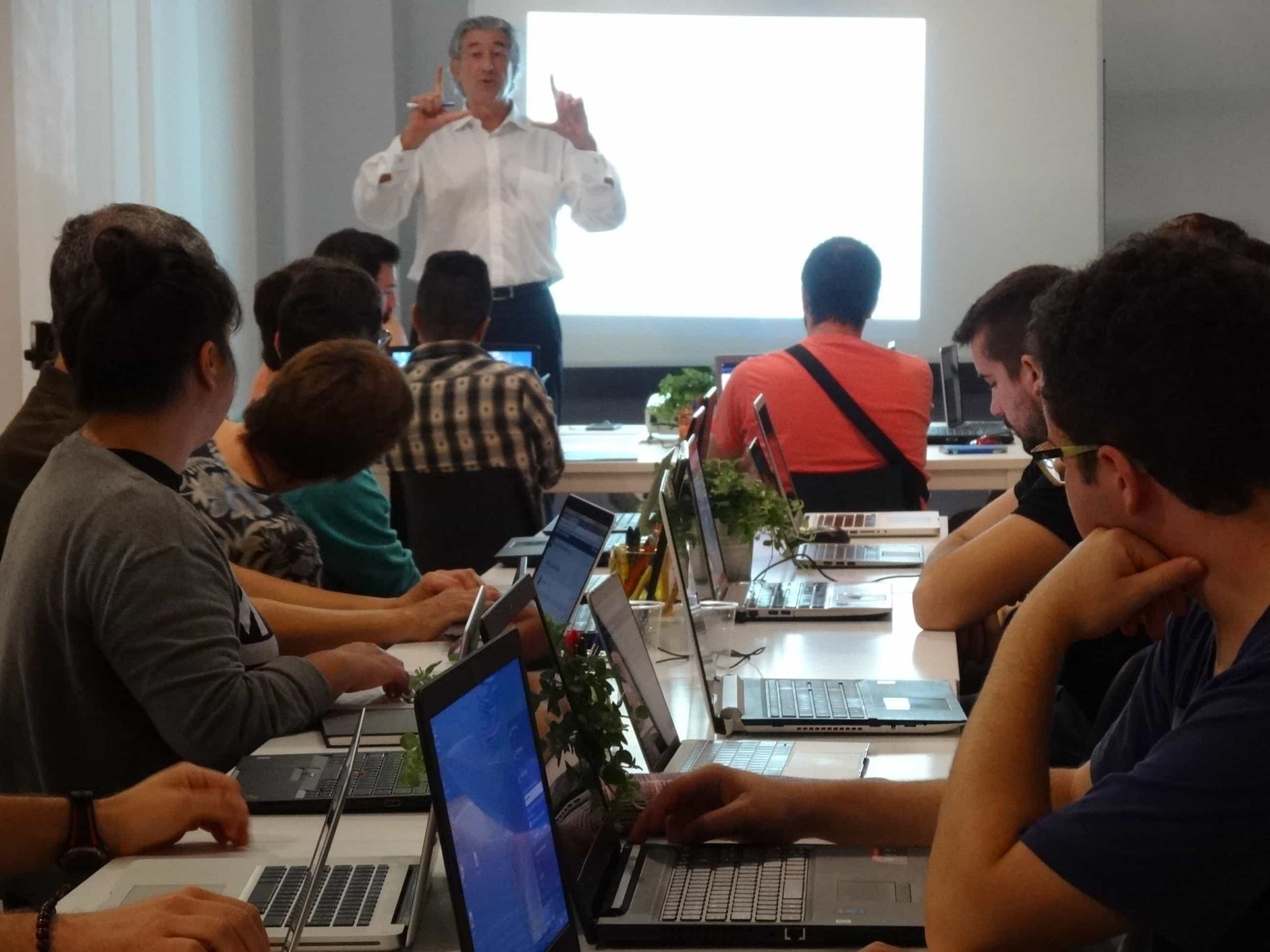“Our job is not finished until you get hired. This is Ubiquim’s goal.” – Sebastián Barajas
The huge increase in the number of companies turning to data science has opened up new horizons in the shape of an exciting and extremely profitable job market for coders. If you’re thinking that you’d like to kick-start your tech career, read on. We interviewed Sebastián Barajas, founder and managing director at the Ubiqum Code Academy, to learn more about data analysis.
Ubiqum Code Academy, an academy that offers different coding bootcamps based on the “learning by doing” methodology, launched the very first programme in data analytics in Europe back in 2016, and this innovative spirit is what continues to drive the company forward as Sebastián and his team are constantly looking for ways to innovate, both in the way they teach and in terms of content, to give students the skills needed to get ahead in the jobs market.
“Our philosophy at Ubiqum is to provide our students with practical and professional skills that can be immediately applicable in the job when they are hired”.
Sebastián BarajasPython and R: the two key languages
If you’re a beginner and you’re wondering what the right language to study might be, there are two languages that reign supreme in the world of data analytics: one is R, and the other is Python. Each is a powerful tool with its own strengths and weaknesses, and the truth is that both are used by professional data analysts in complementary ways. Students at Ubiqum Code Academy gain fluency in both languages, which means you’ll be able to hit the ground running in your new job as you’ll be able to perform equally well in whichever one your employer is using.
What is R used for?
R is used to programme all kinds of statistics, from descriptive analytics to modelling and statistical forecasting. One of its key benefits is that it can produce clear, professional statistical analyses with ease.
It’s backed by a vast software repository called the Comprehensive R Archive Network (CRAN), which has masses of open-source libraries and packages that can get you started and eliminate the need for writing code from scratch for simple functions, saving you lots of time and effort. It’s an open-source resource that’s constantly updated and evolving to keep up with the rapid changes in data science.
What is Python?
Python on the other hand is a high-level, general-purpose programming language that is broader in scope, and in terms of diversity of use it’s the clear winner. Hugely popular and easy to use, it was created by programmers and developers rather than analysts. It has tons of applications and it is used in web, game, software development, in graphical user interfaces and even in operating systems, as well as in data analytics.
Quality of graphic representation
In general, R is better suited to producing high-quality statistical graphics than Python. One of the reasons for this is that graphics have evolved alongside the language itself. Ubiqum Code Academy teaches students how to use packages such as ggplot 2, not simply in order to understand the data, but also to take a look at how best to present it in a business scenario in the real world.
If you thought libraries were always filled with shelves of books…
…think again! Libraries in the world of coding are something quite different, at Caret or NumPy there are no books, and there’s nobody there telling you to be quiet. They’re huge banks of information – you can think of them as a base that you can use to build your project on, and they’re language-specific. Both Python and R are well supported by a vast range of libraries.
“Learning with our project-based methodology you will get practical, hands-on real skills that will make it easier for you to apply them in the job when you are hired. This is ultimately Ubiquim’s goal.”
Sebastián Barajas
Most libraries specialise in a specific area, such as natural language processing (NLP) or predicting data. For example, models from Scikit-learn, one of Python’s most popular machine learning libraries, are used by Spotify to generate music recommendations.
Libraries are communities too, which means that you can always reach out to other programmers if you need some inspiration or get stuck.
A host of different uses
While R is seen more as a specialist language for working with data, Python wins in terms of diversity of use, because it’s so adaptable and accessible –the syntax is simple, and it uses English keywords which makes it stand out in what is a veritable sea of coding languages.
Even if you don’t know anything about code, you’ve certainly heard about artificial intelligence (AI) and machine learning. AI is here to stay, and it’s one of the reasons the job market is booming for data analysts. Companies in every sector have understood its importance, so the future is bright, and this is a field that can only keep on growing.
So, what’s next?
Now you’ve seen the key strengths and weaknesses of Python and R, you might have already made your mind up on which to focus on. That will depend on you –where do your interests lie?, and how do you see your future career developing? If you’re going to be working in pure data science, R is probably going to be your best bet, but if artificial intelligence is your true passion, then Python will be the one for you.
Since the world of data analytics needs both languages functioning symbiotically for the best results, Sebastián Barajas recommends getting a solid grounding in both, as this is the way to maximise job opportunities, making your CV stand out from the crowd. And this is exactly what Santander Open Academy Tech | Reskilling in Data Analytics - Ubiqum Code Academy gives you the chance to do.
Remember, theory is all very well, but what employers are looking out for is practical, hands-on skills, and that’s what Ubiqum Code Academy is all about: learning by doing, learning by coding.
(At the moment the Santander Open Academy Tech | Reskilling in Data Analytics - Ubiqum Code Academy has reached its end, but we encourage you to take a look at the Santander Open Academy to find the training that best suits you and give a boost to your professional career. Seize the chance to develop your knowledge and skills!)


Sebastián Barajas, Founder and Managing Director at the Ubiqum Code Academy
More interesting posts to read...
-

-
 29/09/2025 | Santander Universidades
29/09/2025 | Santander UniversidadesLearning English: the key to better job opportunities
Card text